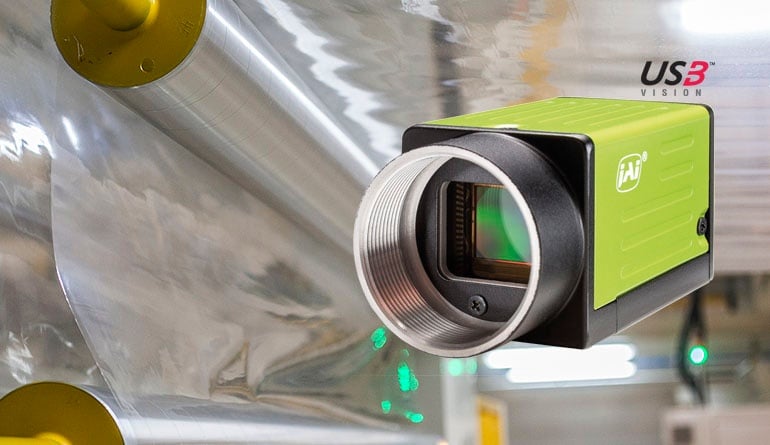JAI Introduces New Polarization Camera Model: The GO-5100MP-USB
JAI has added a new model to its Go Series lineup of small and versatile machine vision cameras. This latest addition is the GO-5100MP-USB, which centers around Sony’s IMX250MZR polarized CMOS image sensor. The camera offers 5.1 megapixels of total resolution and an innovative four-way polarized filter design, enabling advanced imaging and analysis for industrial applications.
Sensor Features
The GO-5100MP-USB features a full resolution of 2464 x 2056 pixels with a compact optical format. Each pixel measures 3.45 µm × 3.45 µm. The polarization capabilities stem from the sensor’s unique filter array, which includes four separate polarizing filters arranged at angles of 0°, 45°, 90°, and 135° in a regular pattern across the sensor.
This arrangement allows each block of four pixels to function as a calculation unit for determining light reflection angle, intensity, and more. The illustration above shows how the Sony IMX250MZR sensor is designed with its polarization capabilities derived from these nano wire-grid arrays arranged at specific angles.
The chip delivers four images in which polarized light is blocked in a specific angle in every image. Each image represents ¼ of the total resolution, or approximately 1.27 megapixels.
Technical Specifications
The camera supports USB3 Vision interface for full-resolution output and can deliver up to 74 frames per second at an 8-bit depth. It also supports higher bit depths such as 10-bit and 12-bit.
Additional features include single-region-of-interest (ROI) and multi-ROI functions, shading compensation, and gamma correction. The camera body measures just 29 x 29 x 41.5 mm with a C-mount lens interface for standard lenses. Built to withstand shock (80G) and vibration (10G), the GO-5100MP-USB is rated for an MTBF exceeding 150,000 hours, making it suitable for demanding industrial environments.
Application Benefits
The use of polarization filters offers multiple advantages. It can reduce reflections or “hot spots” that interfere with standard machine vision techniques—particularly useful when examining shiny materials such as plastics and glass. Polarization also enables the detection of internal material stress, thickness variations, and potential defects like scratches in finished products.
- Automotive/Furniture Industries: Use polarized imaging to detect unwanted blemishes or uneven paint layers on spray-painted surfaces.
- Security/Criminal Investigations: Eliminate glare from car windshields for enhanced facial recognition and evidence collection regarding seatbelt usage violations.
- Glass Inspection: Improve quality control in glass manufacturing by analyzing internal stress points, dents, or inclusions.
Availability
Full-scale production of the GO-5100MP-USB is scheduled to begin in November. For detailed specifications, download the datasheet linked below.
Last Updated: 2025-09-05 02:53:32
